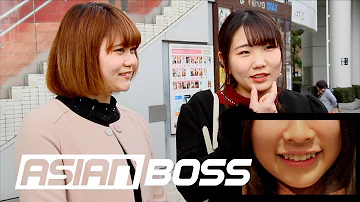Why are Japanese teeth so messed up?
Table des matières
- Why are Japanese teeth so messed up?
- Why are crooked teeth cute in Japan?
- How do you get Yaeba teeth?
- Do Chinese brush their teeth?
- Why do Japanese cover their mouths when they laugh?
- What is fang teeth?
- Is a snaggletooth unattractive?
- Is Yaeba natural?
- Are sharp canine teeth attractive?
- Is it OK to brush your teeth once a day?
- Do Japanese people fix their teeth?
- Do people clean their teeth after lunch in Japan?
- Do people use manual toothbrushes in Japan?
- Why do Japanese people have such good oral hygiene?

Why are Japanese teeth so messed up?
“Japanese jaws are naturally smaller than Western jaws, but eating softer foods in childhood, such as school lunches, has also led to underdeveloped jaws,” he said. Also, since baby food has become more nutricious, “teeth have also become larger. When these canines come in, there isn't enough space for them to emerge.”
Why are crooked teeth cute in Japan?
In Japan itself, crooked teeth or some people called it as vampire teeth were a trend among teenagers, this trend is called Yaeba. Yaeba is loved by Japanese young girls because it is considered to highlight sexual attractiveness.
How do you get Yaeba teeth?
At the dentist, a yaeba procedure places a ceramic protruding false tooth over a patient's upper canine tooth. Some are fixed, while others are removable for mealtimes and sleeping. The price for a removable yaeba is about 31,000 yen ($270).
Do Chinese brush their teeth?
Almost half a billion people in China never brush their teeth, according to the country's health chiefs. The Chinese Preventive Medicine Society believes that less than half of the country's 900m rural population brush regularly while just 10% of the 400m living in cities clean properly.
Why do Japanese cover their mouths when they laugh?
Covering your mouth while laughing means not showing your obvious reactions, and keeping your emotions subtle and shy. This is considered graceful for ladies in Japan. Many Japanese women aim toward this ideal image and follow it as a social norm subconsciously without recognizing they've actually started this gesture.
What is fang teeth?
A fang is a long, pointed tooth. In mammals, a fang is a modified maxillary tooth, used for biting and tearing flesh. In snakes, it is a specialized tooth that is associated with a venom gland (see snake venom). Spiders also have external fangs, which are part of the chelicerae.
Is a snaggletooth unattractive?
A snaggle tooth will rarely cause serious oral hygiene issues, but you may feel embarrassed about your appearance because of it. Some countries prize a snaggle tooth as fashionable or beautiful, but in the United States, it is not considered part of an ideal appearance.
Is Yaeba natural?
In Japan, yaeba (八重歯, "double tooth") are human teeth, especially upper canines, with an uncommonly fang-like appearance. Yaeba most often refers to a tooth overlapping another tooth or protruding from higher in the gum. In Japan it is perceived as a sign of youthfulness and natural beauty.
Are sharp canine teeth attractive?
Similar to the central incisors, the shape of the canines largely determines the appearance your smile conveys. Sharper canines express a more aggressive look, while rounded canines convey a gentler appearance.
Is it OK to brush your teeth once a day?
In fact, most experts say that even with just once-a-day brushing, it is already enough to keep bacteria and cavities at bay. Yes, you read it right. Brushing your teeth once a day is enough to maintain good oral health if it is done correctly.
Do Japanese people fix their teeth?
- In general, most Japanese aren't surgically altering their teeth, but there is also no standard of beauty that dictates straight teeth is perfect, and so in general, Japanese won't go out of their way to fix their crooked (only "bad" from a Western perspective) teeth.
Do people clean their teeth after lunch in Japan?
- It's quite common in Japan for people to clean their teeth after lunch. In some offices in Japan you may often find a few people in the bathroom brushing away and in elementary schools students will all brush their teeth together after their lunch.
Do people use manual toothbrushes in Japan?
- Strangely enough, in Japan there are far more people using manual toothbrushes than electric toothbrushes. The manual toothbrushes you'll find in Japan will probably be quite different from the brushes you'll find in other countries. Japanese toothbrushes tend to be a lot smaller and the bristles are softer and much gentler on the gums and teeth.
Why do Japanese people have such good oral hygiene?
- The combination of the appreciation of hygiene and the pursuit of attractiveness might be at the root of this, but the only thing that can be said for sure is that oral hygiene is a big part of most modern Japanese people's lives. It's quite common in Japan for people to clean their teeth after lunch.













